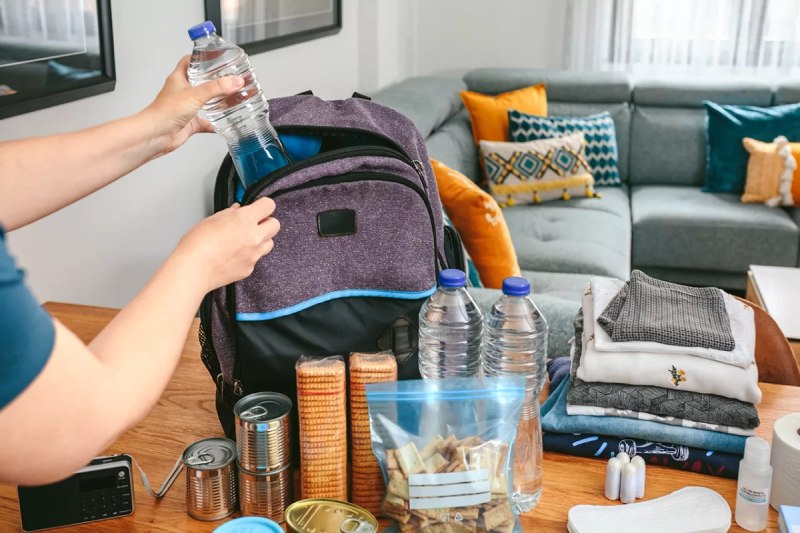Lifestyle
Tips for Getting Your House Ready for a Natural Disaster

A natural disaster can have disastrous financial effects. Fortunately, most of the financial ruin that can result from natural disaster damage can be prevented by a standard home insurance policy; however, there will always be some exposures. Understanding what your home insurance will cover in the event of a natural disaster will help you be more prepared for the unanticipated and will also minimize damage to your property.
How prevalent are natural disasters?
Homes that are in the path of natural disasters may sustain extensive damage, such as broken windows, water damage, or structural damage. According to the National Oceanic and Atmospheric Administration (NOAA), the United States saw 28 billion-dollar severe weather events in 2023, which is a record amount for a single calendar year. The following are the estimated total damages from these events, which come to approximately $93 billion:
Tips to prepare your house in case of a natural disaster
Preparing your house for a disaster should be done as soon as possible. Being proactive is important; while it is not necessary, building the home with wind-proof and fire-proof materials offers some of the best protection. It is still possible to protect your house from natural disasters without having to undertake extensive renovations.
Strengthen windows and doors
Doors may fly off and windows may break due to loose debris during a hurricane or tornado. To ensure that your windows and doors survive a storm, think about installing storm-proof shutters or wind-resistant windows. Before a storm is predicted, you can temporarily board up windows and doors with plywood.
Find water, gas, and electrical lines
You may be given emergency instructions to turn off the home’s gas, electricity, and water supplies when a storm is approaching to minimize the risk of flooding and fire. If neglected, water and power lines can result in further harm. Before departing, disconnect the electrical, gas, and water lines if there is an evacuation order in place.
Make use of sandbags
Sandbags are a useful tool for diverting water, so putting them around doors or in high-risk areas during a hurricane can effectively prevent floodwaters from entering a house. This can be very important in the event of a storm surge. For sufficient protection, the sandbags should be piled at least one foot high. It might be worth having a couple on hand before a storm is predicted to hit if your garage has the room for them to prevent a last-minute rush to the hardware store.
Secure outdoor furniture
Before a storm arrives, make sure that any outdoor furniture on a porch or patio is securely fastened. If at all possible, move loose objects inside, such as grills, sporting goods, and umbrellas. Make sure that before a storm, any small items like toys, yard tools, or other items are not left outside. These things have the potential to seriously harm both your property and perhaps the property of your neighbor.
Prune large trees
Trees can cause major damage during a storm. Heavy branches that dangle over the roof of the house have the potential to fall and cause serious issues, including injuries to occupants. Regularly trim large trees on the property, and ask neighbors to do the same for any trees that cross property lines, to keep the roof safe. Consider establishing a defensible space between your home and any vegetation that might catch a stray ember if you live in a region that is prone to fires.
Secure heavy furniture to the walls
Strong enough earthquakes can topple large furniture pieces and even large appliances such as refrigerators. Things that fall have the potential to seriously hurt people, especially small children. Should the house be situated on or close to a fault line, fasten heavy furniture to the walls using a bracket, and ensure that nothing could be harmed in the event of a fall?
Practice fire-smart landscaping
A wildfire can be prevented from spreading to your house by planting plants that can withstand flames and by giving your garden and yard enough water. Another thing that might lessen your risk is a well-kept lawn free of dried-out, overgrown grass. It’s crucial to realize, though, that under some conditions, practically anything can catch fire.
Avoid pipe bursts when it’s freezing
The likelihood of exposed pipes freezing and bursting increases. Insulating pipes could be a wise choice if you live in an area that experiences frequent cold snaps. Hardware stores sell products for wrapping pipes, such as heat tape or foam tubing. Experts advise completely insulating pipes in exceptionally cold weather before re-wrapping them in plastic and taping the ends. The purpose of the insulation is to act as a barrier against the cold and stop the freezing and expansion of pipe contents.
Make an emergency plan and kit
Medication, cell phone chargers, radios for emergency alerts, non-perishable food items, and bottled water (in case stores are closed and the water supply is affected) are some things to have in an emergency kit. The advice of experts is to have a physical copy of a document that lists local radio stations, insurance policy details, evacuation routes, and a checklist for home security. In the event of a power outage, having both a digital and physical copy might come in handy. Ideally, every person living in your home should be aware of the supplies’ locations and the emergency plan for each kind of calamity. Establish a secure meeting spot or way to get in touch with family members who might be outside the house, if applicable. Remember that following a natural disaster, cell phone service might not be available.
Get ready for a blackout
It can be useful to list the devices that need to be connected to an alternate power source in advance of a possible power outage. You can be better prepared for an outage by keeping battery packs, flashlights, headlamps, portable generators, and backup mobile batteries on hand. Having cooler packs can help you keep lower temperatures for longer because food can spoil in the refrigerator if the power is out for an extended period of time.
Think about a pet plan
You can keep your pets safe, comfortable, and calm during a natural disaster by assembling an emergency kit for them. Ascertain that you have a pet carrier, leash, harness, or other means of transferring your animals in the event of an evacuation. In addition, food, water, litter (if applicable), medicine, medical records, food and water bowls, and a bed (if it fits) should be in your kit.
What home insurance covers during natural disasters
Many, but not all, natural disasters can be financially mitigated by a home insurance policy. Depending on which hazards are covered by your policy. You should be protected against the following under a typical HO-3 house insurance policy:
- Thunderstorms
- Hurricanes
- Tornados
- Wildfires
- Blizzards
- Falling objects
- High winds
- Freezing temperatures
- Weight of snow and ice
Property damage and loss to personal items both inside and outside the house are typically covered by home insurance. Hotel and food costs should be covered by loss of use coverage if it becomes necessary to vacate the house while repairs are being made.
However, some natural disasters, such as earthquake or flood damage, are not covered by typical homeowners insurance policies. It is advised that homeowners who reside in high-risk areas for earthquakes and floods think about getting separate policies for earthquake and flood damage. There may be a hurricane or windstorm deductible in addition to your regular damage deductible in some states where hurricane damage, especially wind damage, may be covered. This deductible is typically 1 to 5 percent of your home’s insured value if you live in a coastal town or another area that is vulnerable to hurricane damage. Your home insurance policy might not cover wildfire damage if you reside in a wildfire zone.
-

 Business4 weeks ago
Business4 weeks agoHow to fill MSME Form 1? Step-by-Step Guide
-
Business4 weeks ago
From Marine to Chief: The Leadership Journey of Sean Mannix
-

 Gadget4 weeks ago
Gadget4 weeks agoAfter Grand Success on BLDC Ceiling Fan, Eff4 Is Launching Smart Bulb
-

 Festivals & Events4 weeks ago
Festivals & Events4 weeks agoGoogle Celebrates Cherry Blossom Season with Animated Doodle
-

 Business2 weeks ago
Business2 weeks agoPrakash and Kamal Hinduja: Driving Social and Environmental Change
-
Education3 weeks ago
Fred DuVal: University Leadership as a Critical Resource for Climate Change Research and Life-Saving Solutions
-

 Sports4 weeks ago
Sports4 weeks ago2025 NASCAR Craftsman Truck Series Baptist Health 200 at Homestead-Miami Speedway: Race Preview, Prediction, Schedule, Entry List, Drivers to Watch and How to Watch
-

 Health2 weeks ago
Health2 weeks agoThe Hinduja Brothers Commitment to Global Health: Empowering Communities Across Borders























